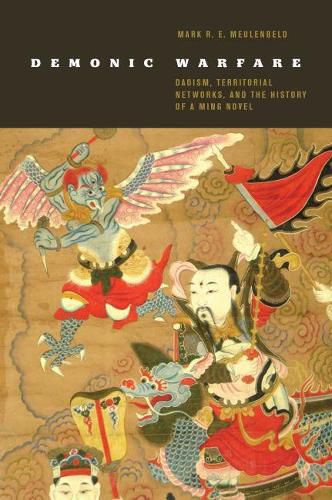Readings Newsletter
Become a Readings Member to make your shopping experience even easier.
Sign in or sign up for free!
You’re not far away from qualifying for FREE standard shipping within Australia
You’ve qualified for FREE standard shipping within Australia
The cart is loading…






Revealing the fundamental continuities that exist between vernacular fiction and exorcist, martial rituals in the vernacular language, Mark Meulenbeld argues that a specific type of Daoist exorcism helped shape vernacular novels in the late Ming dynasty (1368-1644). Focusing on the once famous novel Fengshen yanyi ( Canonization of the Gods ), the author maps out the general ritual structure and divine protagonists that it borrows from much older systems of Daoist exorcism.
By exploring how the novel reflects the specific concerns of communities associated with Fengshen yanyi and its ideology, Meulenbeld is able to reconstruct the cultural sphere in which Daoist exorcist rituals informed late imperial novels. He first looks at temple networks and their religious festivals. Organized by local communities forterritorial protection, these networks featured martial narratives about the powerful and heroic deeds of the gods. He then shows that it is by means of dramatic practiceslike ritual, theatre, and temple processions that divine acts were embodied and brought to life. Much attention is given to local militias who embodied demon soldiers aspart of their defensive strategies. Various Ming emperors actively sought the support of these local religious networks and even continued to invite Daoist ritualists so asto efficiently marshal the forces of local gods with their local demon soldiers into the official, imperial reserves of military power.
This unusual book establishes once and for all the importance of understanding the idealized realities of literary texts within a larger context of cultural practice and socio-political history. Of particular importance is the ongoing dialog with religious ideology that informs these diff erent discourses. Meulenbeld’s book makes a convincing case for the need to debunk the retrospective reading of China through the modern, secular Western categories of literature,
society, and politics. He shows that this disregard of religious dynamics has distorted our understanding of China and that religion cannot be conveniently isolated from scholarly analysis.
$9.00 standard shipping within Australia
FREE standard shipping within Australia for orders over $100.00
Express & International shipping calculated at checkout
Revealing the fundamental continuities that exist between vernacular fiction and exorcist, martial rituals in the vernacular language, Mark Meulenbeld argues that a specific type of Daoist exorcism helped shape vernacular novels in the late Ming dynasty (1368-1644). Focusing on the once famous novel Fengshen yanyi ( Canonization of the Gods ), the author maps out the general ritual structure and divine protagonists that it borrows from much older systems of Daoist exorcism.
By exploring how the novel reflects the specific concerns of communities associated with Fengshen yanyi and its ideology, Meulenbeld is able to reconstruct the cultural sphere in which Daoist exorcist rituals informed late imperial novels. He first looks at temple networks and their religious festivals. Organized by local communities forterritorial protection, these networks featured martial narratives about the powerful and heroic deeds of the gods. He then shows that it is by means of dramatic practiceslike ritual, theatre, and temple processions that divine acts were embodied and brought to life. Much attention is given to local militias who embodied demon soldiers aspart of their defensive strategies. Various Ming emperors actively sought the support of these local religious networks and even continued to invite Daoist ritualists so asto efficiently marshal the forces of local gods with their local demon soldiers into the official, imperial reserves of military power.
This unusual book establishes once and for all the importance of understanding the idealized realities of literary texts within a larger context of cultural practice and socio-political history. Of particular importance is the ongoing dialog with religious ideology that informs these diff erent discourses. Meulenbeld’s book makes a convincing case for the need to debunk the retrospective reading of China through the modern, secular Western categories of literature,
society, and politics. He shows that this disregard of religious dynamics has distorted our understanding of China and that religion cannot be conveniently isolated from scholarly analysis.